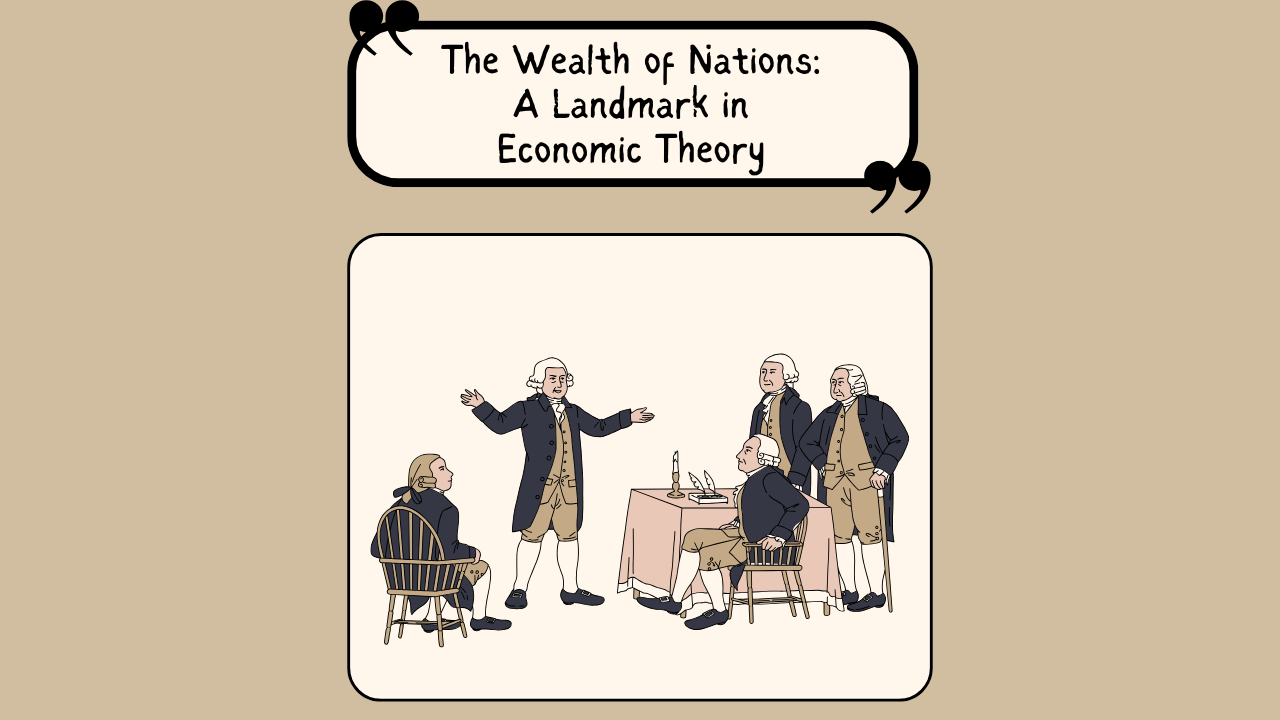In 1776, an economics book titled was published to promote the concept of free enterprise, marking a turning point in economic history. An Inquiry into the Nature and Causes of the Wealth of Nations was written by Adam Smith and presented radical concepts of the free market, division of labor, and self-regulating economy.
This article discusses how the work of Smith paved the way to the present-day free-market capitalism and shaped economic policy and thinking over centuries.
Background: The Author and the Era
Adam Smith: A Pioneer of Economic Thought
Adam Smith (17231790) was a Scottish economist and philosopher, who is commonly credited as the father of modern economics. Smith was born in Kirkcaldy, Scotland and educated at the University of Glasgow and Balliol College, Oxford. His scholastic pathway brought him to a professorship in moral philosophy at the University of Glasgow where he gave public lectures that attracted a lot of attention. These lectures and his later journeys throughout Europe introduced him to a wide variety of intellectual trends, including the writings of contemporaries such as David Hume. An Inquiry into the Nature and Causes of the Wealth of Nations (1776) by Smith is his most influential writing that opposed existing economic theories and presented new revolutionary ideas that still influence economic thinking today.

The Scottish Enlightenment: A Fertile Ground for New Ideas
The Scottish Enlightenment in the middle of the 18th century was a period of intellectual life in Scotland that focused on reason, empirical evidence, and individual liberty. This was a time of great flourishing of ideas in many fields, philosophy, economics, and the sciences. Edinburgh in particular, was a centre of intellectual exchange, drawing thinkers not only across Europe. The economic situation of those days was marked by the transition of feudal systems to more market-oriented economies, with the emerging trade and industry. The participation of Scotland in international trade, particularly with the Americas, gave them realistic insight into the dynamics of the economy, which shaped the views of Smith. The Scottish Enlightenment of rational exploration and questioning of traditional authority gave a favorable context to the innovative ideas of Smith on free markets and economic freedom.
The Wealth of Nations: A Landmark in Economic Theory
Introduction to the Book: Publication Details and Initial Reception
In 1776, an economics book titled An Inquiry into the Nature and Causes of the Wealth of Nations was published to promote the concept of free enterprise. This classic work is written by Adam Smith and is considered as the foundation of modern economic thinking. The book was initially published in London and it attracted instant attention due to its detailed examination of economic systems.
The initial edition sold out within six months, which was a sign of the high interest of the population in its ideas. Modern thinkers such as David Hume and Edward Gibbon commended the work of Smith as profound and clear. Gibbon called it a comprehensive science in one book, and it has had a tremendous influence in economic discourse.

Core Themes
Division of Labor: Smith also pioneered the division of labor where he says that division of labor increases productivity and efficiency. This concept transformed the way things were made and prepared the way to industrialization.
Invisible Hand: One of the most popular ideas that Smith presented is the invisible hand, which implies that people acting in their own self-interest will lead to the overall prosperity of the society without the intention to do so. This is the basis of the argument of minimal government interference with the market.
Critique of Mercantilism: Smith criticized the existing mercantilism that national wealth is pegged on the amount of gold and silver that a country possesses. According to him, the real wealth was the productive ability of the labor and resources of a country and he believed in free trade and open markets.
Advocating for Free Enterprise: Key Principles and Concepts
Self-Interest and Competition: Driving Economic Prosperity
In The Wealth Nations, Adam Smith argues that when people pursue their self-interest they unintentionally contribute to the common good. This idea is commonly known as the invisible hand and it implies that individual benefit contributes to the collective benefit of the society as a result of competitive markets. Competition increases the efficiency in the allocation of resources and promotes innovation and economic growth.

Minimal Government Intervention: Smith’s View on the State’s Role
Smith supported the idea of the state having a minimal role in economic activities and that the state should mainly be involved in defense, justice, and provision of infrastructure. He felt that the government should not interfere a lot in the economy through tariffs and monopolies because they alter the market forces and make an economy stagnate.
Market Dynamics: Supply and Demand as Regulators
Smith emphasized the market self-regulation by the forces of supply and demand. When more people want a product, the price goes up and this indicates to the producers to produce more. On the other hand, when demand declines, then prices decrease, which causes the producers to cut the supply. This market adjustment mechanism is self-regulating and it does not require government intervention as it will adjust to the needs of consumers.
Read Also: Which Statement Accurately Describes One Reason a Delegation of Authority May Be Needed
Impact and Influence: Shaping Economic Policy and Discourse
Global Influence: How Smith’s Ideas Influenced Economic Policies Worldwide
In 1776, an economics book titled An Inquiry into the Nature and Causes of the Wealth of Nations was published to promote the concept of free enterprise. The economic policies of free trade, competition, and a minimal role of government were strongly advocated by Adam Smith and had a significant impact on the economic policies in the world. His thought helped lead to the demise of mercantilism and the acceptance of laissez-faire economics, particularly in the Industrial Revolution in Britain .
Legacy: Enduring Relevance of The Wealth of Nations in Modern Economic Thought
Smith’s work formed the basis of classical economics and remains a source of influence to contemporary economic theory. His ideas of the invisible hand, division of labor and market forces are still relevant in economic learning and policy making. The continuing relevance of The Wealth of Nations can be seen as evidence of its centrality in the history of economic thought and practice .
Final Word
In 1776, an economics book titled was published to promote the concept of free enterprise, introducing ideas that transformed economic thought. The Wealth of Nations by Adam Smith emphasized the division of labor, the invisible hand and the advantages of competition, which shaped the world economic policies. Its philosophy of minimal government involvement and free markets still influences the economies of the modern world. The long-term impact of this work speaks volumes about the importance of this work in advancing and maintaining the ideals of free enterprise.
Read More: Official Zip Quadpay Customer Service Phone Number and Support Guide
